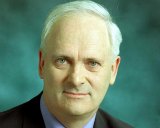Since coming to office in February, Education Minister Ruairi Quinn has certainly been forthright in advancing a secular education agenda. 
His call for the transfer of “at least half” of all Catholic primary schools to alternative patronage caused waves, but his suggestion that the teaching of the sacraments took up too much school time was arguably more controversial.
The Minister suggested that, with literacy and math standards slipping, as measured by international standards, the half an hour each day spent by Irish school children learning about religion might be better spent on improving reading, writing and arithmetic. He suggested that it might be better that religious instruction take place outside school hours.
Some days later, his suggestions met their response, from a former Taoiseach and Cabinet colleague of Mr Quinn, John Bruton (pictured).
Mr Bruton, in a speech delivered as part of a series of Lenten Lectures to a group Catholic, Church of Ireland and Presbyterian parishes in Booterstown in Dublin, pointed out that, when Ireland held a higher rating in the international rankings, it spent exactly the same amount of time in the teaching of religion.
“So why single out religious formation?” Mr Bruton asked.
“Why does the Minister not, for example, refer to the teaching of a second language, Irish in most cases, on which I believe 120 minutes per day is spent? Perhaps because that has not increased either in the period since we got the good result in an earlier test.”
He also made the point that there are a series of other “non-core” subjects dealt with during the school day, such as sport, road safety and nature study. No-one objected to these subjects being taught, Mr Bruton said.
However, he added that if it were maintained that “religion should be dealt with “outside school hours”, but that all these other non-core matters should continue to be dealt with at school, one is saying that religion is less important than road safety, sport, positive health etc”.
“Given that, for most people, religion concerns itself with eternal life, that would be a pretty radical claim to make,” he said.
Perhaps the key part of the speech was Mr Bruton’s defence of religious education itself. He argued that without religion, it is very difficult to come up with a common set of values. Quoting G.K. Chesterton, he said “[O]nce men stop believing in God, they do not believe in nothing. They start to believe in anything”.
He added: “If there is no God, is there any basis for saying that there are any absolute values laid down by any agency greater that the consensus of the human beings who happen to be around at the time? In the absence of a sense of the Absolute, what is a “human right” in one generation, could be quite properly deemed to be a luxury in another generation, and vice versa.
“If we replace religion, what criterion will we use to determining what is “good” and what is “evil”? What will guide our educational system in making value judgements?”
The speech was a full-throated defence of religious education and is very much worth reading in full.
















